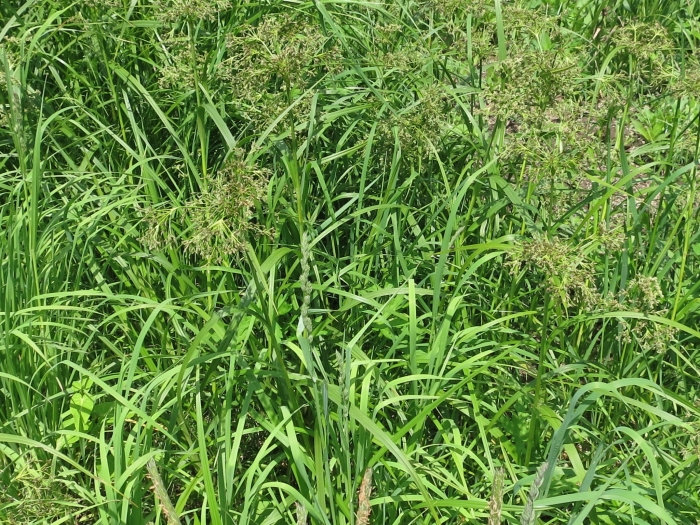Creeping Bulrush
(Scirpus radicans)
Creeping Bulrush (Scirpus radicans)
/
/

Repina Tatyana
CC BY 4.0
Image By:
Repina Tatyana
Recorded By:
Copyright:
CC BY 4.0
Copyright Notice:
Photo by: Repina Tatyana | License Type: CC BY 4.0 | License URL: http://creativecommons.org/licenses/by/4.0/ | Rights Holder: Repina Tatyana | Publisher: iNaturalist | Date Created: 2019-06-18T13:46:35-07:00 |

























Estimated Native Range
Summary
Scirpus radicans, commonly known as Creeping Bulrush, is a perennial herbaceous plant native to a variety of wetland habitats including marshes, fens, wet meadows, and along the margins of ponds and streams across a wide range from Europe to Japan. It typically forms dense colonies with its creeping rhizomes. The plant usually grows to a height of 20-60 cm (8-24 inches) and spreads indefinitely in width through its rhizomes. Scirpus radicans has narrow, grass-like leaves and produces small, brownish spikelets of flowers in the summer months. The flowers are not particularly showy, but they do provide a naturalistic aesthetic in wetland plantings.
Creeping Bulrush is valued for its ability to stabilize soil and filter water, making it an excellent choice for riparian restoration projects, constructed wetlands, and water gardens. It thrives in full sun to part shade and prefers wet, poorly drained soils. While it is not commonly used in traditional ornamental gardens due to its spreading nature, it is an important plant for ecological gardening and habitat creation. Gardeners should be aware that in smaller water features or confined spaces, Scirpus radicans can become invasive and may require management to control its spread.CC BY-SA 4.0
Creeping Bulrush is valued for its ability to stabilize soil and filter water, making it an excellent choice for riparian restoration projects, constructed wetlands, and water gardens. It thrives in full sun to part shade and prefers wet, poorly drained soils. While it is not commonly used in traditional ornamental gardens due to its spreading nature, it is an important plant for ecological gardening and habitat creation. Gardeners should be aware that in smaller water features or confined spaces, Scirpus radicans can become invasive and may require management to control its spread.CC BY-SA 4.0
Plant Description
- Plant Type: Grass
- Height: 3-6 feet
- Width: 1-3 feet
- Growth Rate: Moderate
- Flower Color: N/A
- Flowering Season: Summer
- Leaf Retention: Deciduous
Growth Requirements
- Sun: Full Sun, Part Shade
- Water: Medium, High
- Drainage: Slow, Standing
Common Uses
Erosion Control, Low Maintenance, Water Garden
Natural Habitat
Variety of wetland habitats including marshes, fens, wet meadows, and along the margins of ponds and streams
Other Names
Common Names: Greater Bulrush
Scientific Names: , Scirpus radicans, Cyperus radicans, Nemocharis radicans, Nemocharis radicans, Scirpus hokkaidoensis, Scirpus radicans var. maior, Scirpus radicans var. maior, Scirpus sylvaticus, Scirpus sylvaticus f. radicans
GBIF Accepted Name: